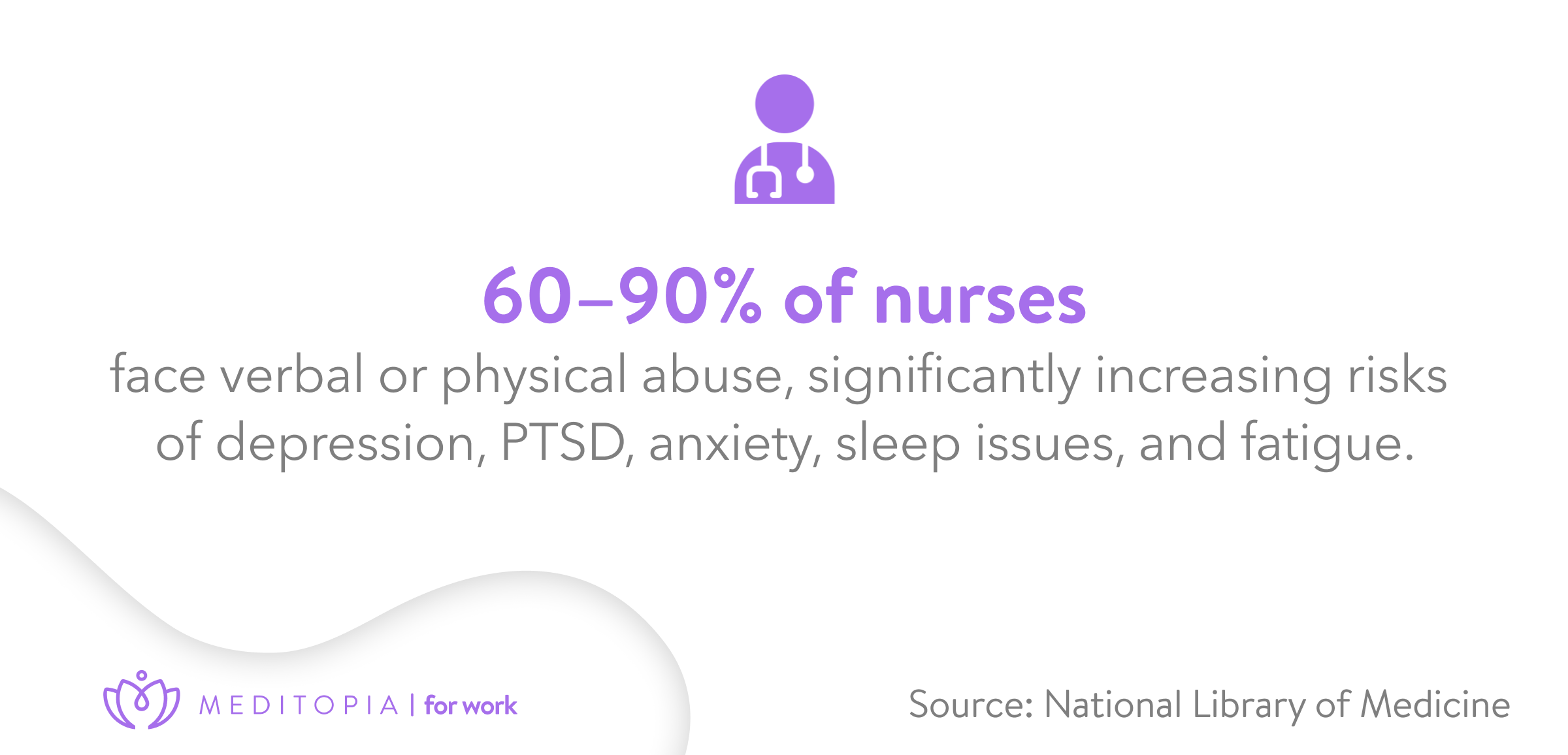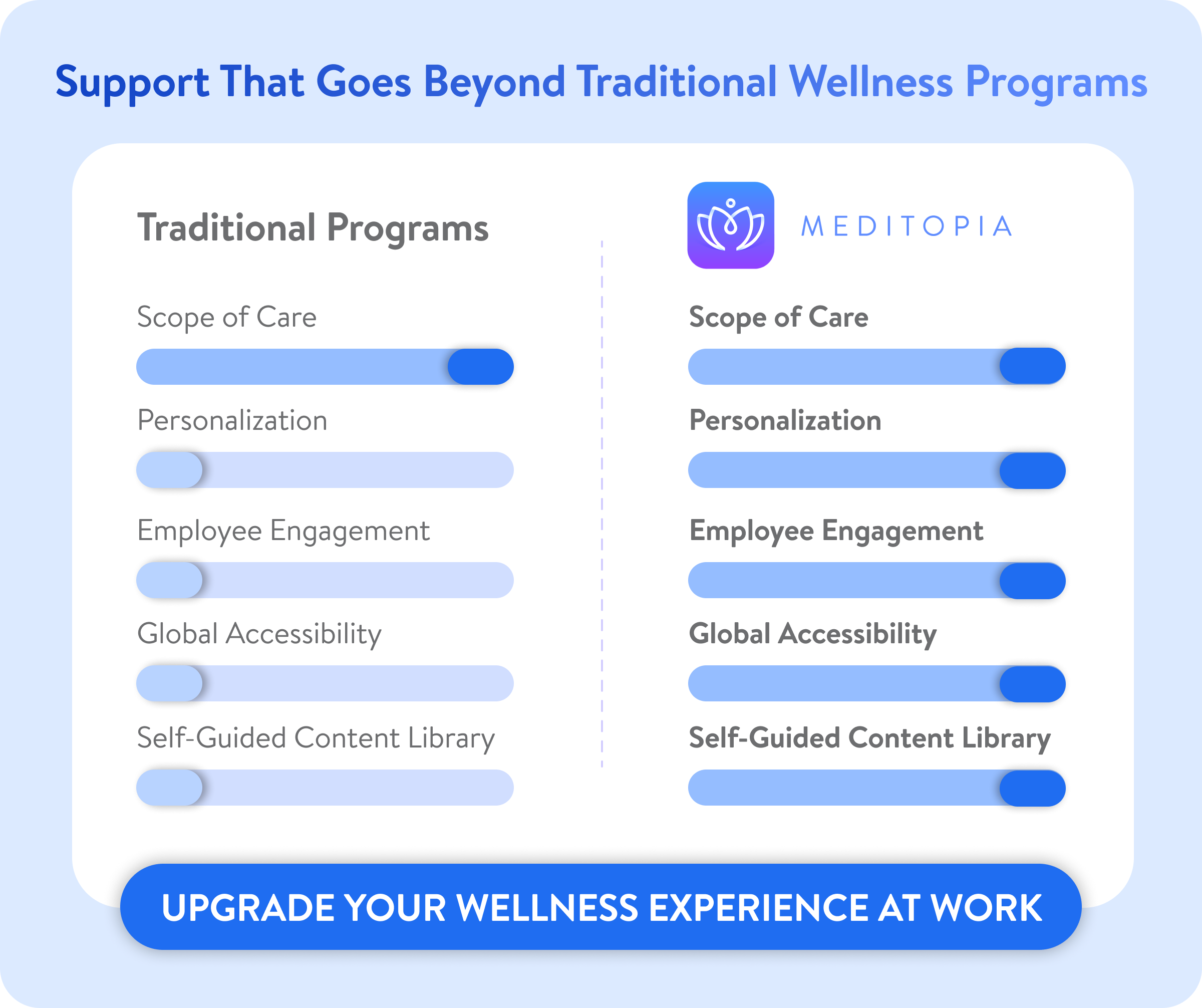Healthcare professionals face relentless demands that impact their wellbeing, as recent data confirms: around 50% of healthcare workers reported feeling burned out in 2023, slightly down from 54% in 2022, but still alarmingly high compared to other sectors [1]. With staffing crises, emotional exhaustion, and patient safety on the line, well-designed healthcare wellness programs can be the difference between burnout and resilience. Let’s dive into how to build solutions that truly support your teams.
Why Wellness Matters: Healthcare Benchmarks
Healthcare professionals operate in one of the most emotionally and physically taxing environments across all industries. Their work involves long hours, high-stakes decisions, and frequent exposure to trauma, conditions that make mental health support not just beneficial, but essential.
- Burnout remains crisis-level: Approximately 65% of nurses reported high stress and burnout in early 2025, while 48% of physicians continue to feel burned out, years after the pandemic peak. These levels directly affect clinical performance, staff turnover, and the risk of medical errors [2].
- Depressive symptoms are widespread: Nearly 46% of nurses experience clinically significant symptoms of depression, which are strongly linked to exposure to workplace violence and burnout [3].
- Among U.S. physicians, burnout rates exceed 50%: while emergency physicians report around 57% burnout. Medical residents experience burnout rates from 27% to 75% depending on specialty, with OB‑GYN trainees at the higher end [4].
- Support and non-clinical staff are also at risk: Nearly 1 in 5 healthcare support workers (e.g. nursing assistants, aides) report symptoms consistent with depression, anxiety, or PTSD, linked to prolonged stress and emotional exposure.
- Secondary trauma and compassion fatigue affect emergency responders and mental health professionals deeply; prevalence ranges from 32%–39% among emergency nurses and child protection staff [5].
Common Mental Health & Wellness Challenges
These healthcare sector challenges are systemic, often ingrained in the structure and pace of clinical environments, and demand wellness programs for healthcare workers that are both comprehensive and practical.
- Burnout and moral injury: High emotional labor, especially in trauma care or critical units, leads to chronic exhaustion, cynicism, and a loss of professional meaning.
- Workplace fatigue and shift disruption: Irregular schedules, double shifts, and 24/7 operations disrupt circadian rhythms, increasing the risk of cognitive lapses and physical health issues.
- Stigma around seeking help: Many healthcare workers fear being perceived as weak or incompetent if they admit to mental strain, reducing uptake of available services.
- Low participation in traditional programs: Wellness offerings often cater to desk-based roles, making them inaccessible or irrelevant to staff on the move or working overnight.
- Violence and psychological trauma: Regular exposure to aggression, whether from patients, families, or even colleagues, has become an occupational hazard for frontline care teams.
- Limited HR bandwidth: Understaffed HR departments struggle to manage yet another initiative without automation or embedded workflows.
For wellness programs for hospital employees to succeed, they must be built around the reality of hospital operations: fast-paced, emotionally taxing, and culturally diverse. That means prioritizing mobile accessibility, micro-interventions during shift breaks, multilingual content, and private, stigma-free engagement.
What an Effective Wellness Program Looks Like in Healthcare
An effective wellness strategy in healthcare isn’t about ping-pong tables or step challenges, it’s about survival, support, and sustainable performance. To truly move the needle, healthcare employee wellness programs must be integrated into daily workflows and accessible across all levels of staff, from ICU nurses to environmental services.
Critical Features of High-Impact Wellness Programs in Healthcare:
- 24/7 accessibility: Hospitals don’t close. Wellness platforms must offer round-the-clock access to support therapy, mental health check-ins, and stress relief tools.
- Mobile-first and offline-ready: Many frontline roles are deskless. Tools must work on smartphones, even during breaks or in poor Wi-Fi zones.
- Anonymous, stigma-free access: Confidential engagement is essential for staff reluctant to seek visible help. Anonymity encourages higher utilization.
- Culturally relevant and multilingual content: Hospitals employ diverse teams. Programs must respect language needs and cultural perspectives around mental health.
- Short-form, clinically relevant content: Micro-content like 5-minute stress resets or guided breathing during shift transitions reduces on-the-job fatigue.
- Peer and group challenges: Team-based tools foster accountability, connection, and morale in high-stress roles.
- Automated onboarding and reporting: With HR departments overstretched, automation ensures seamless rollout, usage tracking, and insight generation.
Essentially, wellness programs in healthcare must be resilient enough to operate at the speed and pressure of clinical care.

Example Wellness Program Benefits for Healthcare
When thoughtfully designed and properly implemented, employee wellness programs healthcare professionals can trust deliver tangible, organization-wide impact.
- Reduced absenteeism and presenteeism: Wellness tools addressing burnout, fatigue, and emotional distress help decrease sick days and improve presence and focus at work.
- Better patient outcomes: Calm, emotionally regulated staff are more attentive, less error-prone, and better equipped to deliver compassionate care.
- Increased retention: Teams that feel psychologically supported are more likely to stay. Effective programs reduce turnover, especially in high-stress specialties and overnight roles.
- Resilience during crises: From trauma exposure to mass casualty events, emotionally prepared workers recover faster and maintain clarity under pressure.
- Stronger workplace culture: Programs that prioritize wellness in healthcare settings foster trust, empathy, and a sense of community; crucial in emotionally charged environments.
These benefits aren’t theoretical. Healthcare systems that adopt robust wellness models report higher employee satisfaction, improved HCAHPS scores, and notable cost savings from fewer errors, lower attrition, and reduced legal risk.
To get the most out of your own program, check our wellness budget ideas blog.
How Leading Healthcare Companies Approach Wellness
HR leaders and wellness managers in healthcare are now expected to look beyond generic benefits and implement industry-specific wellness programs that address high-stress roles, shift work, and on-the-job fatigue. Here's how some of the leading healthcare systems are doing it right.
1. Cleveland Clinic
Cleveland Clinic has introduced regular mindfulness and meditation sessions across its campuses to help clinical and non-clinical staff manage stress.
Key Points of the Program
- Short, guided mindfulness sessions embedded into staff schedules.
- Flexible timing to accommodate different shifts.
- Focused on coping strategies for high-pressure environments.
Results
- Reported improvement in staff focus during shifts and decreased feelings of overwhelm [6].
2. Mayo Clinic
Mayo Clinic supports physical and mental well-being through an onsite wellness center inclusive of gym facilities, a swimming pool, and group fitness classes.
Key Points of the Program
- Fully-equipped facilities available on campus.
- Flexible access aligned with irregular hospital shifts.
- Group exercise options like yoga and strength training encourage team participation.
Results
- Enhanced staff engagement in physical activity and reduced stress levels, particularly among shift workers [7].
3. Stanford Health Care
Stanford Health Care operates a Peer Support and Resiliency Program (PSRP), along with confidential, 24/7 mental health counseling services.
Key Points of the Program
- Peer-led emotional first aid offering immediate, empathetic support.
- Around-the-clock access to professional counselors.
- Safe, stigma-reducing environment for seeking help.
Results
- Improved emotional resilience among staff and increased mental health service utilization [8].
4. AdventHealth
AdventHealth formed an employee orchestra, offering staff an outlet for creative expression and connection.
Key Points of the Program
- Composed of doctors, nurses, and other staff playing instruments together.
- Performances held publicly, including tributes and holiday concerts.
- Designed to foster healing, morale, and community through art.
Results
- Strengthened inter-staff connection and offered a novel avenue for stress relief and collective healing [9].
The Future of Wellness in Healthcare
The next generation of healthcare wellness programs is being shaped by smart, data-driven technologies designed to meet the urgent demands of high-stress, shift-based environments:
- AI-powered emotional support tools: Artificial intelligence is enabling real-time stress detection and personalized mental health support. Solutions like mental health AI chatbots and mood trackers can identify early signs of burnout and prompt timely interventions.
- Wearables for fatigue and recovery monitoring: Devices such as WHOOP, Fitbit, and Apple Watch can track vital metrics like heart rate variability and sleep patterns. These wearables offer data-driven insights for preventing on-the-job fatigue, particularly in 24/7 environments.
- Mobile-first platforms for deskless access: Mobile-first wellness apps are crucial in delivering short, effective interventions—like guided breathing, trauma-sensitive meditations, and 5-minute emotional resets on the go.
- Shift-aware personalization: Advanced tools now adapt wellness content to fit rotating schedules, offering customized routines that align with day, night, or swing shifts. This flexibility increases uptake and engagement among frontline healthcare staff.
- Predictive analytics for HR: Some platforms like Meditopia now include dashboards that help HR leaders identify at-risk teams before issues escalate—improving staff retention and reducing the impact of burnout on workplace performance and patient safety.
Meditopia for Work: Wellness That Fits the Healthcare Industry
Meditopia for Work is purpose-built to support the emotional resilience and operational demands of the healthcare sector. Whether your teams are in emergency rooms, long-term care, or support services, Meditopia offers scalable, stigma-free wellness tools that meet the realities of healthcare work.

Here’s how it supports sustainable employee wellbeing in clinical settings:
- 24/7 availability: Support is accessible any time of day, regardless of rotating shifts or overnight coverage.
- Clinically proven impact: Users report a 27% reduction in stress and a 21% increase in positive emotions within eight weeks of regular use.
- Mobile-first and offline access: Designed for deskless professionals, tools can be accessed during shift breaks, at home, or in low-connectivity areas.
- Specialized webinars and workshops: Sessions focus on trauma-informed care, compassion fatigue, moral injury, and shift-related burnout.
- Confidential mental health support: Therapy, coaching, and guided meditation are offered in 14 languages to reduce stigma and promote access for diverse teams.
- Soul – AI emotional companion: Offers real-time emotional support during high-stress moments, helping staff self-regulate under pressure.
- Bite-sized wellness content: Includes 5-minute breathing exercises, stress resets, and guided check-ins that fit into clinical workflows.
- Anonymous use and automated onboarding: Maximizes adoption while protecting privacy, critical in high-stigma environments like healthcare.
- Expert-led care network: Access to therapists, personal coaches, financial advisors, and more for whole-person support.
With Meditopia, healthcare wellness programs move from optional benefit to embedded infrastructure—helping teams thrive emotionally, reduce turnover, and safeguard patient care.
Explore Employee Wellness Programs Across Industries
Every industry faces its own challenges, and wellness programs reflect that reality.Take a look at how various fields support their people and the trends driving change.

























